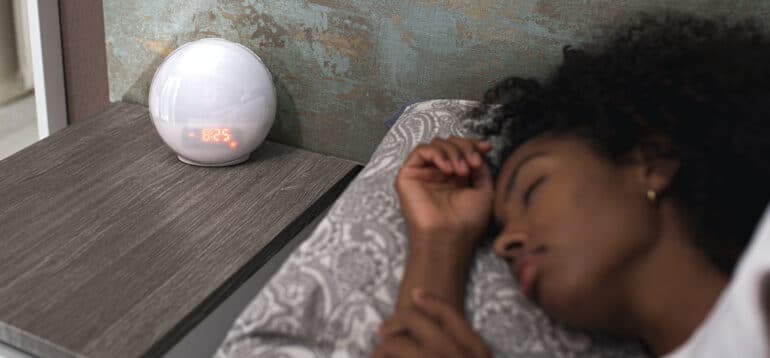

Roughly 25% of people are natural early risers and roughly another 25% are night owls. For many people, waking up early does lead to overall better habits and health, but for some, waking up early just goes against their biological chronotype. Society praises early risers for their productivity and success, but you truly don't need to be an early riser to be productive or successful. These daily tactics will become habit if you stick to them long enough, and eventually you'll find that it's easier to wake up in the mornings. Try to put screens away at least one hour, but ideally 2 hours, before bedtime. Avoid bright light in the evenings and have a media curfew.Eat a high protein breakfast soon after waking.Use the RISEUP Method: Refrain from hitting the snooze button, Increase activity in the first hour awake, Shower or wash face, Expose yourself to sunlight and Upbeat music, and Phone a friend.Maintain a consistent wake time, even on the weekends.Pull back your curtains or go for a brief walk to get that exposure. Exposure to bright light first thing in the morning helps suppress melatonin production and reset your body clock. Get some morning light, when possible, for 20 to 30 minutes.Don't snooze, which can make it even harder to wake up (even if you are not trying to shift your body clock).

Start small: Set your alarm 15 minutes earlier every couple of days, continuing until you reach your ideal wake-up time.If you aren't naturally an early riser, you'll have to use tactics such as light exposure and gradual changes to your bedtime to shift your body clock. +26 more See all photos Tips for waking up earlier

Probablyscience sleep expert how to#
Related: How to Tell if You're Not Getting Enough Sleep And if you're naturally an early riser, quality sleep should be enough to make it easier to wake up in the mornings. Once you pinpoint your triggers of poor sleep, you can start implementing changes for a better night's rest. And sugar disrupts sleep by causing all sorts of physiological changes. High-fat foods, in particular, take longer to digest and acidic foods, such as tomato sauce, can cause acid reflux. The anxiety probably prolonged the time it took you to fall asleep, and diet choices can disrupt your sleep. You won't have to wonder much why you didn't get any sleep - the answers are in your journal. You were stressed, so you ate pizza and ice cream for dinner. You may want to start tracking your sleep if you don't already, as well as keeping a food journal and a regular journal so you can go back and pinpoint what may have caused a sleepless night.įor instance, say you write in your journal that you're worried about a big work project. For example, nutrient deficiencies and anxiety are two common reasons why people can't sleep at night, Scott said. In addition to the poor-sleep culprits discussed earlier, you should also look to your overall state of physical and mental well-being. How to identify sleep issues to wake up earlier "Obviously, this can result in sleep deprivation and all of its consequences if their working hours are not in alignment with their body clock." "Night owls often struggle against a society that is geared to early risers," Cralle told CNET.

Everyone has a unique chronotype that regulate their sleep cycle.


 0 kommentar(er)
0 kommentar(er)
